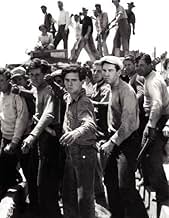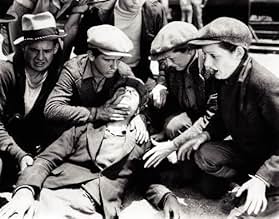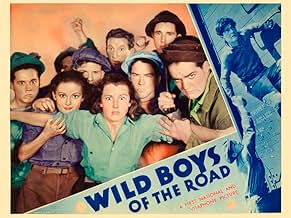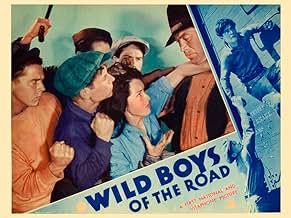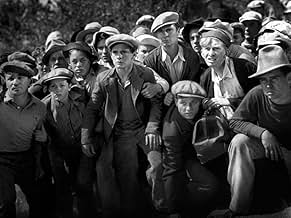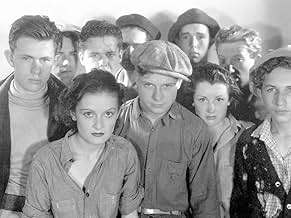अपनी भाषा में प्लॉट जोड़ेंIn the depths of the Depression, two teenage boys strike out on their own in order to help their struggling parents and find life on the road tougher than expected.In the depths of the Depression, two teenage boys strike out on their own in order to help their struggling parents and find life on the road tougher than expected.In the depths of the Depression, two teenage boys strike out on their own in order to help their struggling parents and find life on the road tougher than expected.
- पुरस्कार
- कुल 1 जीत
- Sally
- (as Dorothy Coonan)
- Boy
- (बिना क्रेडिट के)
- Police Sergeant
- (बिना क्रेडिट के)
- Policeman in Court
- (बिना क्रेडिट के)
- Brakeman Throwing Stones
- (बिना क्रेडिट के)
- Youth in Line-up
- (बिना क्रेडिट के)
फ़ीचर्ड समीक्षाएं
With their east coast (New "Yawk?") accents, and rough around the edges "Bowery Boys"-style (harken, Leo Gorcey!), Frankie Darrow and a gang of displaced down-on-their-luck (formerly middle class?) teens band together and roam the countryside on foot or by rail, getting into hot water seemingly everywhere they go. Amazing graphic scenes for 1933 include a kid's leg being amputated by a train and an attempted rape scene.
Miserable living conditions and hunger are also depicted with kids lying cheating and stealing to stay alive, but willing to straighten themselves out when given a chance.
You'd think Warner Brothers was taking a risk financing a film that was so bleak and lacking in entertainment value for people that may have been LIVING the kinds of scenes shown, but the film also seems like a propaganda piece for Roosevelt's New Deal. There's a Roosevelt look-alike judge who places his hand, almost in a blessing, on poor Frankie's head and says "things are going to get better very soon".
Overall, Wild Boys of the Road is an interesting social drama that deserves more exposure and recognition.
Frankie Darro and Edwin Phillips portray the juvenile leads Eddie and Tommy, with Darro's performance effective and appealing. Their characters indulge in the usual teenage shenanigans until the depression overtakes their parents. As times toughen, and Eddie's father can't find work, Eddie decides to sell his jalopy to help out. This sets up the first of many splendid scenes, as Eddie's tough-guy veneer drops just long enough to share raw emotions with his father (Grant Mitchell). Zero cringe factor here, Wellman excels at emotions between men and it's never maudlin.
Hitting the (rail)road to find work, Eddie and Tommy encounter Sally, an adorable, nose-scrintching Dorothy Coonan dressed as a man. And the three set off across the country, with high ideals and optimism clashing with depression realities. Brutal and raw, this is a journey you, too, must take. A page of America's history told so expertly as to make you laugh and cry simultaneously.
Ms. Coonan (Sally) quit films after "Wild Boys" to marry director "Wild" Bill Wellman, and remain his his wife until his death in 1975. My highest recommendation.
The story and the situation is what puts this film over. There are no stars in Wild Boys Of The Road although some of the players eventually got reputations as competent character actors. The most well known person in this film would have to be Ward Bond playing the part of the train brakeman who sees that one of the Wild Boys is actually a girl and rapes her. Bond in his early days did play thugs like these for the most part.
The generation that proceeded me lived through the Great Depression. My uncles were in their teens at the time this film was made. In fact one of my uncles before he died told me how he left school and went to work on a farm in Brockport owned by the husband of my grandmother's cousin. He considered himself incredibly lucky to even get that kind of work even from family. Both of them could easily have been part of the gang of homeless youth.
The film centers on three of them, Frankie Darro and Edwin Phillips, a pair of kids from small town USA in the west somewhere are both up against it. Darro's father is laid off and Phillips's has died, leaving both families right on the poverty line as they would be described today. Darro and Phillips take off for the east and along the way meet up with Dorothy Coonan who is in drag for her own protection, rightly so as she finds out later. The film concerns their adventures on the road, the railroad to be precise as they catch rides aboard freight trains with an eye out for the railroad police.
Curiously enough one Hollywood star was living just this kind of life at this point. Robert Mitchum and his brother John would have been teens at this time and also left home to find any kind of work. His memories, should his widow Dorothy ever divulge them, could make the basis for another Wild Boys Of The Road.
Note in the climax scene in the courtroom where Darro, Coonan, and Phillips are before Judge Robert Barrat who usually was a bad guy in films, but is a sympathetic judge here, the Blue Eagle symbolizing the National Recovery Administration. It was one of the first initiatives of the New Deal and its presence in the film is a symbol of hope for these kids. But later on a more substantial program directly aimed at these youths was passed right around the time Wild Boys Of The Road would have been in theaters.
The Civilian Conservations Corps which took homeless kids off the streets and put them to work beautifying America's National Parks and a lot of other rural area would have been home to Darro, Phillips and the whole rest of the railroad freight hoppers. Back then liberal was not a dirty word and it was all right for government to care about the welfare of its citizens. The CCC was one of the best of the New Deal programs and it lasted all the way until World War II was declared.
And it's to the CCC which provided real salvation for so many youths of the time like Darro, Phillips and the rest that this review is respectfully dedicated to.
क्या आपको पता है
- ट्रिवियाThe movie shown in the movie theater scene (about an hour into the film) is another Warner Bros. release, Footlight Parade (1933).
- गूफ़Sally's piece of cake jumps from the plate into her hands between shots.
- भाव
Eddie: [to the judge] I knew all that stuff about you helping us was baloney. I'll tell you why we can't go home: because our folks are poor. They can't get jobs and there isn't enough to eat. What good will it do you to send us home to starve? You say you've got to send us to jail to keep us off the streets. Well, that's a lie. You're sending us to jail because you don't want to see us. You want to forget us. But you can't do it because I'm not the only one. There's thousands just like me, and there's more hitting the road every day.
Tommy: [also to the judge] You read in the papers about giving people help. The banks get it. The soldiers get it. The breweries get it. And they're always yelling about giving it to the farmers. What about us? We're kids!
- कनेक्शनFeatured in Alibi Mark (1937)
- साउंडट्रैकThe Gold Diggers' Song (We're in the Money)
(uncredited)
Music by Harry Warren
[Played after the kids leave the dance; also whistled by Eddie (Frankie Darro)]
टॉप पसंद
- How long is Wild Boys of the Road?Alexa द्वारा संचालित
विवरण
- रिलीज़ की तारीख़
- कंट्री ऑफ़ ओरिजिन
- भाषा
- इस रूप में भी जाना जाता है
- Junaci Pavlove ulice
- फ़िल्माने की जगहें
- Southern Pacific Taylor Yard, ग्लेनडेल, कैलिफोर्निया, संयुक्त राज्य अमेरिका(train yard sequence)
- उत्पादन कंपनी
- IMDbPro पर और कंपनी क्रेडिट देखें
- चलने की अवधि1 घंटा 8 मिनट
- रंग
- ध्वनि मिश्रण
- पक्ष अनुपात
- 1.37 : 1
इस पेज में योगदान दें



